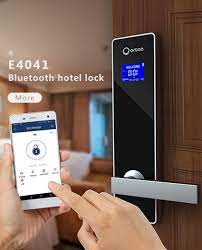Bluetooth Hotel Lock
The basic principle behind Bluetooth technology is that two electronic devices are paired; one cannot work without the other. For Bluetooth door locks and accessories, you need to have to main parts: The lock itself The key (for example, your iPhone or an access control fob) In short, as you approach the door, you can transmit a signal or code from your iPhone (working like a key) to the lock. The lock receives that signal and automatically opens; thus eliminating the need to carry or use a key. Now that’s just a simple explanation. A fully functional “smart” locking device must also have a solid Wi-Fi connection and a Bluetooth capable home security system. However, just like your smartphone connects with your FitBit, a Bluetooth lock connects with code key device. .
Advantages
- Improve The Check-In/Out Process The check-in experience at your hotel can have a significant impact on guest satisfaction. In fact, a mere 5-minute wait can tank guest satisfaction scores by as much as 47%. Mobile keyless entry is the linchpin in providing guests an easier, faster, and more convenient check-in option. They’ll also be able to check out seamlessly, saving your guests and your staff a lot of time and energy.
- Faster Bolster Hotel Safety And Security Mobile room keys use an encrypted token to provide the most secure form of room access available. This means that no one can gain unauthorized access by stealing a keycard (or simply picking it up from where it was left) or hacking into the hotel server. Each digital key is completely unique and cannot be duplicated or reissued, even for people staying in the same room. Digital keys also benefit from the added security layer of a retinal scan, fingerprint, passcode, pattern or password used by most people for smartphone access.
- Smarter Provide Easy Access To Services The same app that your guests can use to unlock their rooms can also be used to improve the stay experience in other ways. Through the app, you could also provide useful information about your hotel, amenities, and nearby points of interest. Many hotels allow guests to contact the front desk, request housekeeping, make reservations or order room service right from the app.
- Help Your Staff Automating day-to-day tasks can ease your employees’ workload. By reviewing and approving guest check-ins prior to arrival, you can reduce traffic at the front desk by as much as 20%, freeing up staff to focus their efforts on improving the guest experience in other areas.
- Customize It For Your Brand Booking decisions are made based on a number of factors, often including how good a hotel’s mobile app is. A great app is a solid indicator of above-and-beyond customer service. Digital key experts like OpenKey can create a customized standalone app that is tailor-made for your hotel, with all of the information and features that you need to provide great service to your guests.
- Stand Out From Competitors In a recent survey, nearly half of all guests say that keyless entry is an important feature. In fact, 60% of guests say they are more likely to choose a hotel with mobile check-in and room access, but less than 20% of hotels actually offer it. By 2022, mobile keys will be the gold standard—smart hoteliers are getting ahead of this tidal wave.
Uses
As Bluetooth locks become more advanced for home and commercial door lock usage, their advantages are quite impressive too: Great range of use. If your kids forget their keys in Milton, you can unlock the front door from Cambridge or Kitchener-Waterloo. In fact, some Bluetooth locks have a global reach. No more keys to use or lose. Many modern cars have eliminated the need for traditional keys. Bluetooth lock hardware installations can do the same for your home. No need to fumble in your purse or pocket for keys. Just approach the lock and the device will do the rest. Extremely helpful in an emergency situation. Strong and reliable. Bluetooth deadbolts are just as tough and secure as their traditional counterparts. You aren’t compromising anything in terms of safety or performance. Easy to share. If you want, you can send a Bluetooth lock electronic wireless code to anyone. Conversely, you can also disable its functionality if it’s required. Encryption technology. If your phone or fob were stolen, the Bluetooth unlock code isn’t just there for anyone to see. It’s encrypted, which means it cannot be read.

